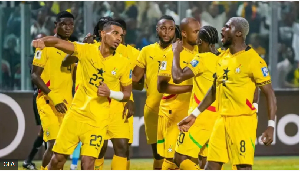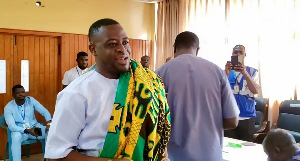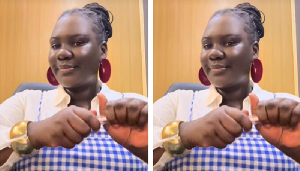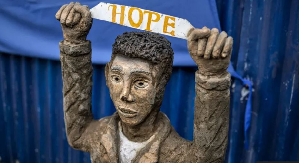Access to clean water for drinking and other household activities has been a major problem for most developing countries around the world including Ghana.
The World Health Organization sees access to water as a human right and for that matter a birth right of every human being.
This right is therefore expected to safeguard the dignity and equal worth of each person and cannot be taken away.
There are however, obstacles to overcome in fulfilling the human right to water.
These obstacles include poor management of freshwater, lack of planning unequal distribution of water and sanitation and privatization of water services.
Thus, in the year 2000, the WHO established that 1.1 billion people did not have access to an improved water supply that was able to provide each person with 20 or more litres of safe water each day. 80 percent of these 1.1 billion people live in rural areas.
2.4 billion People were without adequate sanitation and 2.3 billion suffer from waterborne diseases each year. Between 14,000 and 30, 000 people die from avoidable water-related diseases each day.
Currently, an estimated one-third of the world’s population lives in countries where there is moderate to severe water stress.
By 2025, it is estimated that two thirds of the world’s population will be living in areas experiencing water stress.
Having collectively failed to meet the Millennium Development Goals by 2015, the development community has transitioned to the Sustainable Development Goals - the 6th of which is “to ensure access to water and sanitation for all”.
Today, the 22nd day of March, marks the World Water Day, an idea of the UN birthed some 24 years ago on which stakeholders in the water and sanitation sector usually come together to share ideas, celebrate their successes, take stock of their challenges and strategics on the way forward.
This year’s celebration is being marked with the theme “Water and Jobs – Better Water, Better Jobs”.
Water is indeed life, and plays a pivotal role that affects every facet of our lives whether available or in scarce.
Generally for most of us in urban areas where access to water is less of a challenge, we oft gloss over the importance of water or lack of it.
For the entire half of this decade, my team and I have had the opportunity to move round every region in this country supporting communities and corporate Ghana in ensuring, hundreds of thousands of people do not have to wake up to the harrowing thought of where cometh from, the next gallon of water for today’s living.
Prominent amongst these corporate organization is Guinness Ghana Breweries Limited (GGBL) and their parent company, Diageo PLC - the worlds’ largest beverage maker.
Speak of GGBL and surely the first things that comes to mind is the dark stout, malted drinks and Alvaro.
For the social and entertainment biased, they come out to you as sponsors of events like Old school reunion, beach jams and our senior national soccer team, the Blackstars.
Well, beyond these obvious public brand images of GGBL lies an entire engine dedicated to enriching the lives of communities by providing reliable water and sanitation solutions through their flagship Water of Life Program (WoL).
Commenced in 2007, the program has worked to deliver close to 80 water projects of varying capacities across all regions in the country.
This program which commenced with the provision of a series of small hand pumps has over the years evolved into arguably one of the best corporate social responsibility programs in the West African sub region.
Within the 5 years that we have been privileged to work on the water of life programme, we have observed a high level of dedication by management at both local and global levels towards ensuring the success of program.
At GGBL, the program is not seen as an offshoot of their core business but rather as an integral part of organizational growth.
This thinking has led to the active seeking out and adoption of global best practices in delivering projects.
Our first engagement with this water of life program was in 2011 when we were called upon by the corporate relations of GGBL to undertake an audit of close to 60 historic projects.
We as M&E consultants were particularly intrigued by the seriousness, sincerity and openness with which the organization approached the audit.
The GGBL/Diageo required that the audit covered all aspects of the projects starting from internal procedures in project selection through to its implementation and post implementation management. Particular emphasis was placed on sustainability of the projects post implementation.
This approach ensured that, findings of the audit and its recommendations did not end up on the shelves but quickly synthesized and crystallized into concrete strategies and practices that guides subsequent implementations.
This led to the strengthening of existing key processes such as quality of project infrastructure, community engagement and project management post completion.
Additionally, newer components were incorporated into the project delivery cycle, notably the institutionalization of standardized performance monitoring indicators, baseline and post completion validation for all new projects.
Keeping with their approach of going beyond what is usually required, in 2014, GGBL commissioned a full social impact assessment evaluation of the WoL program as a means of identifying the contribution of the program to beneficiary communities.
Results of the evaluation showed that, the WoL projects have become the major and reliable source of water supply to 79 percent of beneficiary households, contributed to the empowerment of women by supporting 37 percent of women in their commercial activities, shaves off 28 percent of the time taken to collect water daily which translates into 13 full working days per annum, enhancing their participation in community governance.
Also, the projects were found to have contributed to the reduction of the incidence of water borne diseases per households from 15 percent to 3 percent in beneficiary communities.
For a beneficiary institution like the Maamobi polyclinic, the provision of a WoL project saved the clinic an estimated 64 percent of annual expenditure on water.
An estimated total of 34,000 jobs are being supported by the projects with 11,000 of these being new jobs started by the beneficiaries’ post-implementation of the WoL projects.
In terms of revenue generated to local assemblies, it is estimated that, by collecting the minimum level of taxes for the different classes of business supported would accrue annual tax revenue of 2.2million Ghana Cedis per annum.
On the occasion of World Water Day 2016 with the theme water and jobs, we highlight a selection of jobs supported by reliable water sources within local communities.
The UN estimates that, almost half of the world's workers - 1.5 billion people - work in water related sectors and nearly all jobs depend on water and those that ensure its safe delivery.
For the Water of Life programme, its impact on jobs and livelihoods span the corporate NGOs serving as implementing partners, consulting firms like Hanover-green and most importantly small business in beneficiary communities.
The impact of the water projects on small businesses in local communities cannot be overemphasized.
For example, for the women of Aduadeng in the Bosomtwe district whose main source of livelihood is the processing of palm oil using water from a WoL hand pump and the microbrewers of local drink “pito” in Begyinetang, a rural community in the dry northern parts of Upper West region, not having these water projects would imply loss of their regular source of income.
Countless other businesses especially food vendors are guaranteed a greater certainty of having reliable water supply on a daily basis to sustain their business and families.
It is the desired hope that, corporate bodies engaged in provision of water projects to communities, go beyond the basics of paying for the infrastructure and move towards adopting a more holistic approach to ensure projects are not only constructed but take into consideration the full water needs of the beneficiary communities such as quantity, quality and siting of outlets, ensuring project sustainability, monitoring and at least post implementation evaluations.
In summary, our advice to corporate Ghana is that, to ensure organizations derive the best value for money on their investments, community investment projects should be given no less dedication and attention than that given to their core business.
Furthermore, it’s our appeal to corporate organizations to collaborate in providing clean water to communities as there exist countless opportunities to address the inequalities in water supply especially for the millions residing in the urban slums and communities without access to safe drinking water.
Health News of Tuesday, 22 March 2016
Source: hanovergreengh.com













